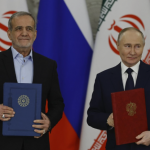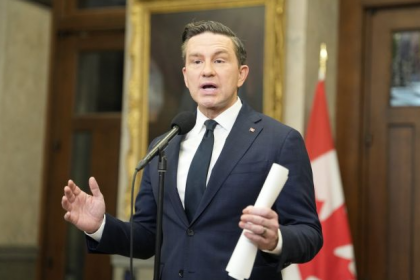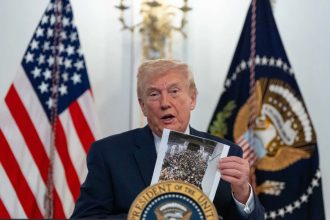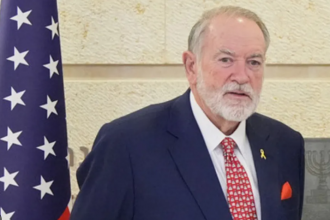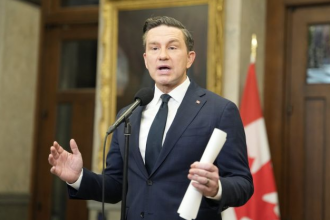Jan 06, 2025, Ottawa: Prime Minister Justin Trudeau is stepping down as Liberal leader and is proroguing Parliament as the Liberal Party of Canada embarks on the journey to replace him.
In a historic announcement outside his official Rideau Cottage residence, Trudeau declared his intention to remain prime minister until a new leader is chosen.
Citing the inability to overcome “internal battles,” Trudeau said that he intends to resign as both Liberal leader and prime minister, once his party “selects its next leader through a robust, nationwide, competitive process.”
The prime minister said he asked the president of the Liberal party to begin that work, now.
“Last night over dinner, I told my kids about the decision I’m sharing with you today,” he said. “This country deserves a real choice in the next election, and it has become clear to me that if I’m having to fight internal battles, I cannot be the best option in that election.”
Trudeau also met with Gov. Gen. Mary Simon this morning where he asked for, and was granted the prorogation of Parliament, until March 24. This brings an end to the longest session of a minority Parliament in Canadian history.
“As you all know, I’m a fighter. Every bone in my body has always told me to fight… I care deeply about this country,” Trudeau said. He went on to say that he hopes removing himself “from the equation” will tamp down the level of polarization in the current federal political conversation.
“I truly feel that removing the contention around my own continued leadership is an opportunity to bring the temperature down, have a government that will focus on the complex issues that are coming forward in the coming months,” Trudeau said
“While the party gets to have a full national process that brings in people from right across the country, and decides about the best person to carry the progressive Liberal standard into the next election.”
Live updates as Justin Trudeau resigns as Liberal Leader(opens in a new tab)
Speaking publicly for the first time since his embattled Liberal minority government became embroiled in turmoil following the bombshell resignation of his deputy Chrystia Freeland in mid-December, Trudeau only took a handful of reporters’ questions.
Trudeau said that while he is not one to back away from a fight, “particularly when a fight is as important as this one is,” he has “always been driven by my love for Canada, by my desire to serve Canadians, and by what is in the best interests of Canadians.”
Speaking briefly about his legacy, Trudeau said looking back, he’s proud of his work to “fight for the middle class,” and increasing benefits for families that have helped drop poverty rates. He also cited his work on Indigenous reconciliation.
As for his regrets, he said there are “probably many,” but referred to his decision to abandon his electoral reform pledge as a central one.
“I do wish that we’d been able to change the way we elect our governments in this country,” he said.
Resignation comes with a parliamentary pause
Trudeau requesting prorogation to give his party time to run an expedited leadership race without facing the prospect of falling on a confidence vote, will also bring an end to the procedural filibuster that’s stalled nearly all parliamentary business for months.
“Despite best efforts to work through it, Parliament has been paralyzed for months,” Trudeau said Monday. “It’s time for a reset. It’s time for the temperature to come down.”
The House of Commons was scheduled to resume on Jan. 27, at which point the Conservatives were angling to advance a non-confidence motion within days, as the NDP indicated last month they were ready to vote to bring down the Liberal minority in the new year.
Prorogation has effectively killed all legislative business that hasn’t passed, leaving measures promised in Trudeau’s ill-fated fall economic statement in limbo, as well as the Liberals’ long-languishing pledge to crack down on harmful online content.
Asking for the House of Commons to be halted until late March comes after Trudeau’s advisers received legal guidance indicating that was the longest the government could go without approving spending.
The next session would begin with a speech from the throne, which would set the stage for potentially a series of key confidence votes. If the Liberals fall on any of them, it could be the first step in triggering an early federal election.
“This prorogation will take us only into March, and there will be confidence votes in March, in the passing of supply, that will allow Parliament to weigh in on confidence in a way that is entirely in keeping with all the principles of democracy and the workings of our strong institutions,”
Trudeau’s desire to steer the government through the next two months comes as Canada braces for the start of U.S. president-elect Donald Trump’s second term.
PM met with top staffers amid caucus pressure
This comes as CTV News has confirmed that staffers in the PMO met Monday morning to discuss Trudeau’s political future.
Two sources told CTV News that they expected the prime minister and his Chief of Staff Katie Telford to convey to the broader team in that meeting that that they did not see a path forward for Trudeau’s continued leadership, in the absence of support from the Liberal caucus.
A majority of the Ontario, Atlantic, Quebec and B.C. caucuses determined over the Christmas break that they want Trudeau to step aside, and a national, daylong caucus to discuss that fact and next steps has been set for Wednesday.
In the mid-week meeting – set to be his first with the full Liberal caucus(opens in a new tab) since telling them he’d be reflecting on his next steps over the holidays – it was expected Trudeau would be confronted with calls to resign, as many MPs have become increasingly concerned about the party’s popularity heading into the 2025 federal election with him as a leader.
Now, it’s likely that the meeting will focus on the party, and caucus’ next steps in setting off on the steps to pick Trudeau’s successor.
MPs being briefed on party leadership rules: sources
In anticipation that Trudeau would have to publicly address the escalating pressure he’s facing early in the new year, Liberal supporters have already started contemplating the party’s leadership rules, as well as the kinds of preparations needed for a shortened race.
Two sources tell CTV News that Liberal MPs have been invited to a special two-hour virtual briefing Monday afternoon on the party’s constitution and caucus’ role in leadership issues.
According to the Liberal Party of Canada’s constitution(opens in a new tab), “upon the occurrence of a leadership trigger event,” or if the leader announces their resignation, a meeting of the national board of directors must be called within 27 days.
Then, in consultation with the caucus, the board could appoint an interim leader, though that may not be a step taken in this instance given Trudeau’s intention to stay on as the search unfolds. The top party officials would also be required to set a date for a leadership vote as well as other parameters around the race.
Trudeau has been the leader of the Liberal Party of Canada since 2013, and prime minister since 2015. Sworn in on Nov. 4, 2015, Justin Trudeau will be the seventh longest-serving prime minister in Canadian history.
If he stays until March 24, he will have led Canada for nine years and 140 days. His father Pierre Elliott Trudeau served 15 years and 164 days, over two terms.



